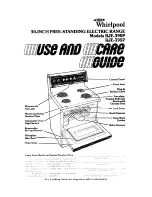
Vermont Castings • Aspen C3 Owner’s Manual_R5 • 2019 - ___ • 11/19
10
8390-950c
WARNING
!
This wood heater has a manufactured-set minimum low
burn rate that must not be altered. It is against federal
regulations to alter this setting or otherwise operate this
wood heater in a manner inconsistent with operating
instructions in this manual.
B. Draft Management:
Your stove is only one part of a system that includes the
chimney, the operator, the fuel and the home. The other parts
of the system will affect how well the stove works. When there
is a good match between all the parts, the stove works well.
Wood stove operation depends on natural (unforced) draft.
Natural draft occurs when exhaust gas is hotter (and therefore
lighter) than the outdoor air at the top of the chimney. The
greater the temperature difference, the stronger the draft.
As the hot exhaust gas rises out of the chimney it generates
suction that draws air into the stove for combustion. A slow,
lazy fire indicates a weak draft. A brisk fire, supported only
by air entering the stove through the normal inlets, indicates
a good draft. The inlets are passive; they regulate how much
air can enter the stove, but they do not move air into it.
The efficiency of a modern woodburning appliance, (in which
the amount of air available for combustion is regulated),
depends on the chimney to keep exhaust gases warm all
the way outdoors. The characteristics of your chimney -
whether it is steel or masonry, interior or exterior, matched
or mismatched to the stove collar - determine how quickly
it will warm up and how well it will sustain the optimum
temperatures necessary to maintain strong draft and efficient
combustion. Here follows a description of various flue system
characteristics and related effects on stove performance.
Masonry Chimney:
Although masonry is the traditional material used for chimney
construction, it can have distinct performance disadvantages
when used to vent a controlled-combustion woodstove.
Masonry forms an effective ‘heat sink’ - that is, it absorbs
and holds heat for long periods of time. The large mass,
however, may take a long time to become hot enough to
sustain a strong draft. The larger the chimney (in total mass),
the longer it will take to warm up. Cold masonry will actually
cool exhaust gases enough to diminish draft strength. This
problem is compounded if the chimney is located outside the
home or if the chimney flue has a cross-sectional size larger
than the stove outlet.
Steel Chimney:
Most factory-made ‘Class A’ steel chimneys have a layer of
insulation around the inner flue. This insulation keeps the
smoke warm and protects the surrounding structure from the
high flue temperatures. Because the insulation is less dense
than masonry, the inner steel liner warms up more quickly
than a masonry chimney. Although steel chimneys are not
as attractive as their masonry counterparts, they are very
durable and generally outperform masonry.
Inside/Outside Location:
Because the chimney’s function is to keep the smoke warm,
it is best to locate it inside the house. This location uses the
house as insulation for the flue and allows some radiant heat
release from the flue into the home. Since an interior chimney
does not continuously lose its heat to the outdoors, it takes
less heat from the stove to get it warm and keep it warm.
Flue Sizing:
The flue size for a controlled-combustion appliance should
be based on the cross-sectional volume of the stove flue
outlet. In this case, more is definitely not better. Hot gases
lose heat through expansion; if a stove with a six-inch flue
collar (28 square inch area) is vented into a 10” x 10” flue, the
gases will expand to over three times their original volume.
As gases cool with expansion, draft strength decreases. If an
oversized flue is also outside the house, the heat it absorbs
will be conducted to the outdoor air and the flue will remain
relatively cool.
It is common for a masonry flue to be oversized for the
stove. Such a chimney can take quite a while to warm up
and the stove performance will likely be disappointing. The
best solution to an oversize flue problem is the installation
of an insulated steel chimney liner of the same diameter as
the appliance flue outlet. The liner keeps the exhaust gas
warm and the result is a stronger draft. An uninsulated liner
is a second choice - although the liner will keep the exhaust
restricted to its original volume, the air around the liner will
require time and heat energy to warm up.
Check your local codes. You may be required to install a flue
liner in any oversize or masonry flue.
Pipe & Chimney Layout
:
Every bend in the flue will act as a brake on the exhaust as
it flows from the firebox to the chimney cap. The ideal pipe
and chimney layout is straight up from the stove through a
completely straight chimney. Use this layout if at all possible
as it will promote optimum stove performance and simplify
maintenance.
If the stovepipe must elbow to enter a chimney, locate the
elbow about midway between the stove top and the chimney
thimble. This configuration lets the smoke speed up before it
must turn, keeps some pipe in the room for heat transfer, and
allows long-term flexibility for installing a different appliance
without relocating the thimble.
There should be no more than eight feet of single-wall stove
pipe between the stove and a chimney. Longer runs can cool
the smoke enough to cause draft and creosote problems.
Use double-wall stove pipe for longer runs.










































